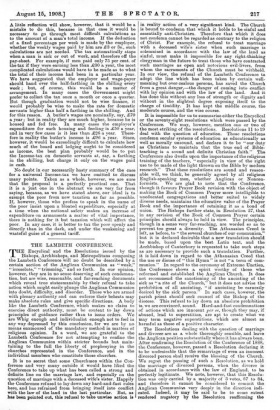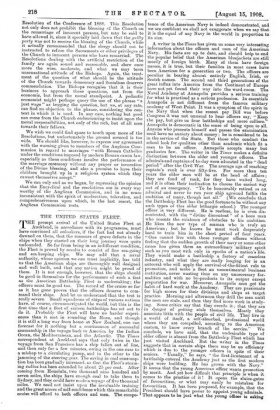THE LAMBETH CONFERENCE. T HE Encyclical' and the Resolutions issued by
the Bishops, Archbishops, and Metropolitans composing the Lambeth Conference will no doubt be described by a certain section of the Anglican Communion as "weak," "irresolute," "trimming," and so forth. In our opinion, however, they are in no sense deserving of such condemna- tion, but are wise, reasonable, and far-reaching documents which reveal true statesmanship by their refusal to take action which might easily plunge the Anglican Communion into doubt, difficulty, and disorder. Those who are armed with plenary authority and can enforce their behests may make absolute rules and give specific directions. A body like the Lambeth Conference, which makes no claim to exercise direct authority, must be content to lay down principles of guidance rather than to issue orders. We are Whig enough and individualist enough not to feel in any way depressed by this conclusion, for we are by no means enamoured of the mandatory method in matters of religious opinion. In a word, we are grateful to the Lambeth Conference for not attempting to confine the Anglican Communion within stricter bounds but main- taining to the full the liberty of prophesying in the churches represented in the Conference, and in the individual members who constitute those churches.
It is no secret that some Churchmen within the Con- ference and very many outside it would have liked the Conference to take up what has been called a strong and definite line on the marriage law, and especially on the question of marriage with a deceased wife's sister. Happily the Conference refused to lay down any hard-and-fast rules here, and has refrained from bringing itself into conflict with the law of the land in the last particular. But, as has been pointed out, this refusal to take unwise action is in reality action of a very significant kind. The Church is bound to condemn that which it holds to be sinful and essentially anti-Christian. Therefore that which it does not condemn cannot be regarded as contrary to the religion of Christ. For example, the refusal to treat marriage with a deceased wife's sister when such marriage is solemnised in accordance with the law of the land as sinful, must make it impossible for any right-thinking clergyman in the future to treat those who have contracted such marriages as open and notorious evil-livers, from whom the sacraments of the Church must be withheld. In our view, the refusal of the Lambeth Conference to adopt the line which has been taken by certain well- meaning but over-zealous persons, has saved the Church from a great danger,—the danger of coming into conflict with lay opinion and with the law of the land. And it has done this without any loss of strength or dignity and without in the slightest degree exposing itself to the charge of timidity. It has kept the middle course, the moderate course, and the wise course.
It is impossible for us to summarise either the Encyclical or the seventy-eight resolutions which were passed by the Conference. We may, however, mention one or two of the most striking of the resolutions. Resolutions 11 to 19 deal with the question of education. Those resolutions condemn secular systems of education as educationally as well as morally unsound, and declare it to be "our duty as Christians to maintain that the true end of Bible- teaching is a sound and definite Christian faith." The Conference also dwells upon the importance of the religious training of the teachers, "especially in view of the right use to be made of the light thrown on the Bible by modern research." That these resolutions are sound and reason- able will, we think, be generally agreed by all religious English-speaking men, whether Anglican or Noncon- formists. We are glad to note that the Conference, though it favours Prayer Book revision with the object of making the Book of Common Prayer more intelligible to uneducated congregations and better suited to widely diverse needs, maintains the educative value of the Prayer Book and the importance of retaining it as a bond of union. The Bishops further state, in Resolution 27, that in any revision of the Book of Common Prayer certain principles should always be held in view. The principles, though in a sense very far-reaching, are worded so as to prevent too great a diversity. The Athanasian Creed is left, as before, to "the several churches of our communion," but it is declared desirable that a new translation should be made, based upon the best Latin text, and the Archbishop of Canterbury is requested to take such steps as are necessary to provide such a translation. Further, it is laid down in regard to the Athanasian Creed that the use or disuse of "this Hymn" is not "a term of com- munion." In regard to the ceremony of Extreme Unction, the Conference shows a spirit worthy of those who reformed and established the Anglican Church. It does not recommend the sanctioning of the anointing of the sick as "a rite of the Church," but it does not advise the prohibition of all anointing, "if anointing be earnestly desired by the sick person." In such cases, however, the parish priest should seek counsel of the Bishop of the diocese. This refusal to lay down an absolute prohibition is, we are convinced, sound. Hard-and-fast condemnations of actions which are innocent per se, though they may, if abused, lead to superstition, are apt to create what we may term negative superstitions, which are almost as harmful as those of a positive character.
The Resolutions dealing with the question of marriage and divorce are as a whole thoroughly sensible, and leave the Anglican position substantially where it has always been. After confirming the Resolution of the Conference of 1888, the Conference, however, passed a Resolution declaring it to be undesirable that the remarriage of even an innocent divorced person shall receive the blessing of the Church. We regret the passing of such a Resolution, as we hold the marriage of divorced persons, when the divorce is obtained in accordance with the law of England, to be perfectly legitimate. We note, however, that this Resolu- tion was only carried by a majority of 3 votes, 87 to 84, and therefore it cannot be considered to commit the Anglican Communion very deeply in the direction indi- cated. Indeed, it may be said to be to some extent rendered nugatory by the Resolution reaffirming the Resolution of the Conference of 1888. This Resolution not only does not prohibit the blessing of the Church on the remarriage of innocent persons, but may be said to have allowed it, since it specially laid down that the guilty party was not to receive the blessing of the Church, while it actually recommended that the clergy should not be instructed to refuse the Sacraments or other privileges of the Church to innocent persons who have remarried. The Resolutions dealing with the artificial restriction of the family are again sound and reasonable, and show once more the wise, moderate, and what we may term unsensational attitude of the Bishops. Again, the treat- ment of the question of what should be the attitude of the Church towards democracy and Socialism deserves commendation. The Bishops recognise that it is their business to approach these questions, not from the economic, but from the moral standpoint. A pedantic economist might perhaps query the use of the phrase "a just wage" as begging the question, but we, at any rate, can find no objection to the phrase, considering the con- text in which it is used. In any ease, nothing but good can come from the Church endeavouring to insist upon the moral responsibilities, not only of the rich, but of all men towards their fellows.
We wish we could find space to touch upon more of the Resolutions, but unfortunately the ground covered is too wide. We should like, however, to express our agreement with the warning given to members of the Anglican Com- munion in regard to marriages "with Roman Catholics under the conditions imposed by modern Roman canon law, especially as these conditions involve the performance of the marriage ceremony without any prayer or invocation of the Divine blessing, and also a promise to have their children brought up in a religious system which they cannot themselves accept."
We can only end as we began, by expressing the opinion that the Encyclical and the resolutions are in every way worthy of the Anglican Communion, and in no sense inconsistent with the spirit of moderation, toleration, and comprehensiveness upon which, in the last resort, the Anglican Communion rests.







































 Previous page
Previous page